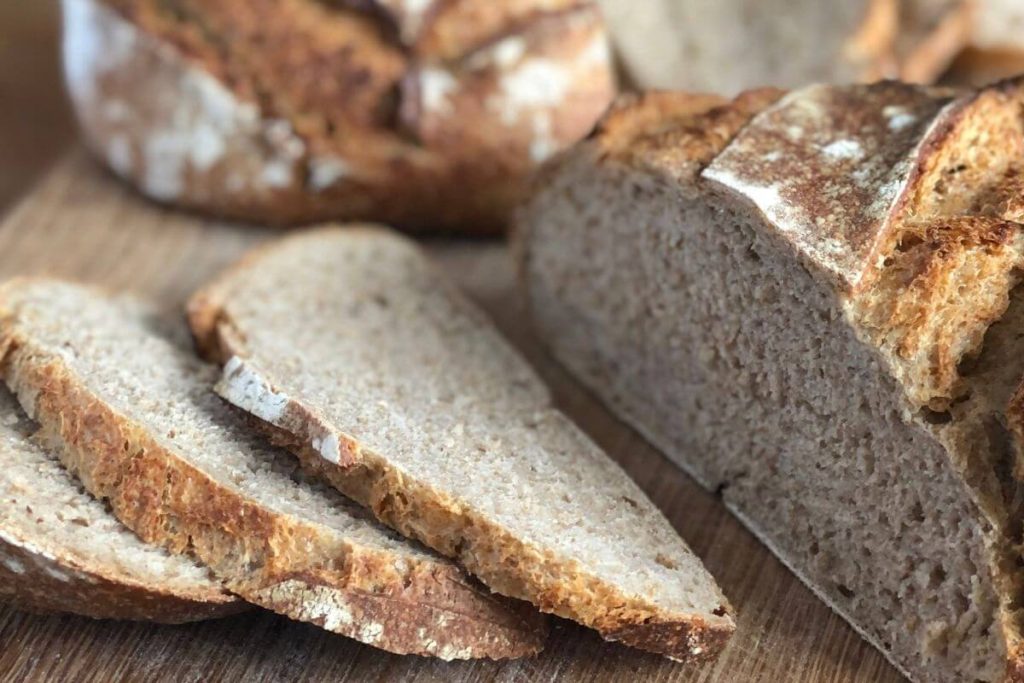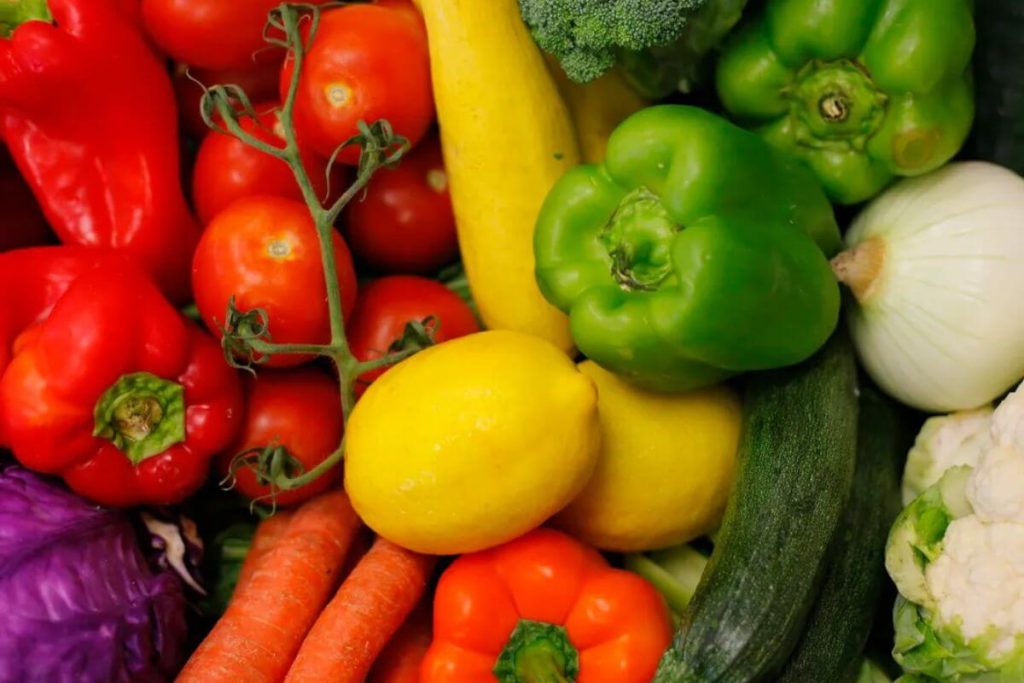Sourdough bread, with its distinctive tangy flavor and chewy texture, has been a beloved staple in many cultures around the world for centuries.
Its unique taste and texture, coupled with its natural fermentation process, have made it a favorite among bread connoisseurs and health enthusiasts alike.
But for those who adhere to a vegan lifestyle, one question often arises: Is sourdough bread vegan?
The short answer is: Yes, sourdough bread is generally vegan-friendly as it does not contain any animal deived ingredients.
In this comprehensive guide, we will delve into the world of sourdough bread and explore why it is considered vegan.
Introduction to Sourdough Bread

What is Sourdough Bread?
Sourdough bread is a type of bread that stands out due to its natural fermentation process.
Unlike most commercially produced breads that utilize baker’s yeast to rise, sourdough bread relies on a fermented mixture of flour and water, known as a “starter,” to rise.
This starter is a living culture that contains wild yeast and lactobacilli, which work together to leaven the bread and give it its characteristic sour flavor.
The process of making sourdough bread is an ancient baking tradition, believed to date back to 3700 BCE in Switzerland. It was likely discovered by accident when bread dough was left out and good bacteria found its way in, causing the dough to rise.
This method of bread making was used for thousands of years, until the late 19th century when commercial yeast became widely available, making the bread-making process faster and more predictable.
Sourdough bread has a distinctive tangy flavor, a chewy texture, and a hard crust. These characteristics, along with its natural fermentation process, have made it a favorite among many bread lovers.
In addition, sourdough bread is often touted for its potential health benefits, including easier digestibility and a lower glycemic index compared to breads made with commercial yeast.
The Popularity of Sourdough Bread
In recent years, sourdough bread has seen a resurgence in popularity. This can be attributed to a number of factors. First, there is a growing interest in artisanal and homemade foods, and sourdough bread certainly fits into these categories.
Making sourdough bread is a slow process that requires patience and skill, and many people find the process of nurturing a sourdough starter and baking their own bread to be a rewarding experience.
Second, there is increasing awareness about the potential health benefits of sourdough bread. The natural fermentation process used in making sourdough bread can make it easier to digest and lower in the glycemic index compared to other types of bread.
Some studies also suggest that the lactic acid bacteria present in sourdough bread can provide probiotic benefits.
Finally, the unique taste and texture of sourdough bread have contributed to its popularity. The tangy flavor and chewy texture of sourdough bread are unlike any other type of bread, making it a favorite choice for sandwiches, toast, and more.
Understanding Veganism

What Does It Mean to Be Vegan?
Veganism is more than just a diet, it’s a lifestyle choice that seeks to exclude, as far as possible and practicable, all forms of exploitation of, and cruelty to, animals for food, clothing, or any other purpose.
This means that vegans aim to avoid not only meat but also eggs, dairy products, and other animal-derived ingredients. Many vegans also avoid products that have been tested on animals and do not wear clothing made from animal products, such as leather or wool.
In terms of diet, a vegan diet is plant-based and includes fruits, vegetables, whole grains, legumes, nuts, and seeds. Many foods are naturally vegan, while others are made vegan by substituting animal products with plant-based ingredients.
For example, milk can be replaced with plant-based alternatives like almond milk, soy milk, or oat milk, and eggs can be replaced with flaxseeds or chia seeds in certain recipes.
Why Do People Choose Veganism?
People choose to follow a vegan lifestyle for various reasons. For some, it’s a decision based on ethics and animal rights. They believe that all creatures have a right to life and freedom and therefore reject any form of animal exploitation.
For others, environmental concerns drive their decision. Animal agriculture is a major contributor to greenhouse gas emissions, deforestation, and water pollution. By choosing a plant-based diet, they aim to reduce their environmental impact.
Health is another common reason for choosing veganism. A plant-based diet is often rich in fiber, vitamins, and antioxidants, and lower in saturated fat and cholesterol. This can lead to a lower risk of diseases such as heart disease, high blood pressure, and certain types of cancer.
Regardless of the reasons for choosing veganism, one common challenge that many vegans face is determining whether certain processed or prepared foods fit into their diet. This brings us back to our original question: Is sourdough bread vegan?
Is Sourdough Bread Vegan?
Ingredients of Sourdough Bread
At its most basic, sourdough bread is made from just three ingredients: flour, water, and salt.
The fermentation process is facilitated by the sourdough starter, which is a mixture of flour and water that has been allowed to ferment over time.
This starter contains wild yeast and lactobacilli, which leaven the bread and give it its characteristic sour flavor.
Are These Ingredients Vegan?
Given the basic ingredients, you might think that sourdough bread is naturally vegan. And in many cases, you would be right.
Flour, water, and salt are all plant-based and therefore vegan. The wild yeast and lactobacilli in the sourdough starter are also suitable for a vegan diet.
However, not all sourdough bread is created equal. Some recipes or store-bought varieties may include non-vegan ingredients.
For example, some bakers might add a small amount of honey to their sourdough bread for extra flavor.
Others might enrich their dough with dairy products like milk or butter, or use a non-vegan starter. Therefore, it’s always important to check the ingredients list when purchasing sourdough bread, or to ask about the ingredients if you’re buying bread from a bakery.
Vegan Alternatives to Sourdough Bread
Vegan Bread Options in the Market
If you’re following a vegan diet and love bread, don’t worry. There are plenty of vegan bread options available in the market. These include whole grain bread, rye bread, pita bread, and many others.
Some brands even offer specifically labeled vegan bread to make your choice easier.
When shopping for vegan bread, it’s important to read the ingredients list carefully. Look out for non-vegan ingredients like honey, milk products (like whey, casein, or lactose), eggs, or certain types of mono- and diglycerides, which can be derived from animal fat.
Homemade Vegan Sourdough Bread Recipe
For those who enjoy baking, making your own vegan sourdough bread at home can be a rewarding experience.
This allows you to control the ingredients and ensure that the bread is indeed vegan. Here’s a simple recipe to get you started:
- Prepare the Starter: Mix equal parts flour and water in a jar. Cover loosely and let it sit at room temperature. Feed the starter with equal parts flour and water every 24 hours for about 5 days, until it’s bubbly and ready to use.
- Make the Dough: Mix about a cup of your starter with water and flour. Cover and let it rest for about an hour.
- Add Salt: After the dough has rested, add salt and mix it in.
- Bulk Fermentation: Let the dough sit at room temperature for about 3 to 5 hours, until it has roughly doubled in size.
- Shape and Proof: Shape the dough into a loaf and let it proof in a loaf pan or a proofing basket until it has risen significantly.
- Bake: Bake the bread in a preheated oven for about 30 to 40 minutes, or until the crust is golden brown and the bread sounds hollow when tapped on the bottom.
Remember, making sourdough bread is a slow process that requires patience, but the result is well worth the wait!
Key Takeaways:
- Sourdough bread is vegan friendly.
- While the basic ingredients of sourdough bread are vegan, some variations may include non-vegan ingredients.
- Always check the ingredients list when purchasing bread.
- Regardless of your dietary choices, it’s possible to enjoy the tangy, satisfying flavor of sourdough bread while adhering to a vegan lifestyle.
Remember, the choice to follow a vegan diet is a personal one and can be influenced by various factors. It’s always important to do your own research and consult with a healthcare professional if needed.
Whether you’re a long-time vegan or just starting your journey, there are plenty of resources available to help you make informed dietary choices.
In the end, the question “Is sourdough bread vegan?” can be answered with a tentative “yes” – but always check the ingredients to be sure. Happy eating!
